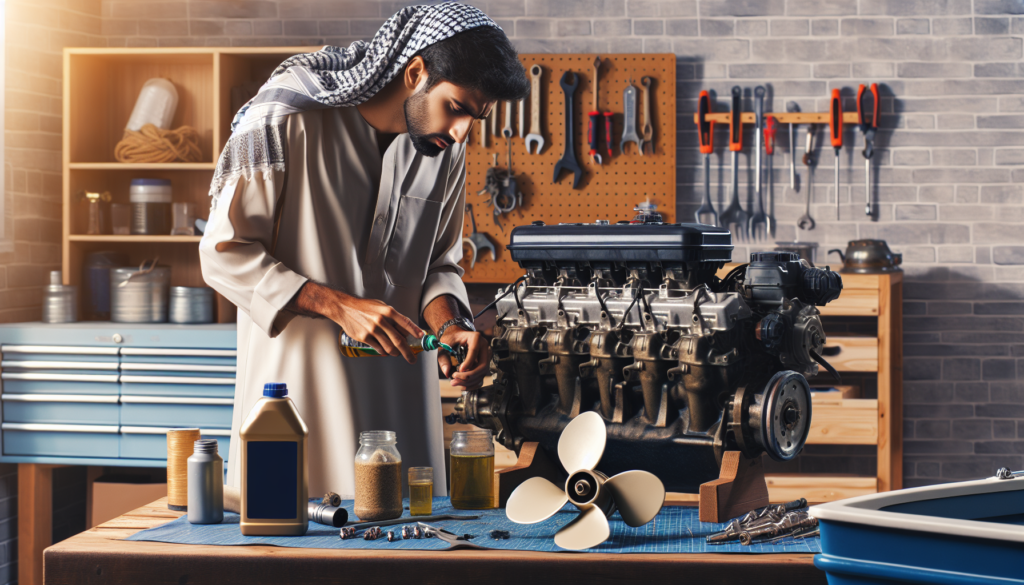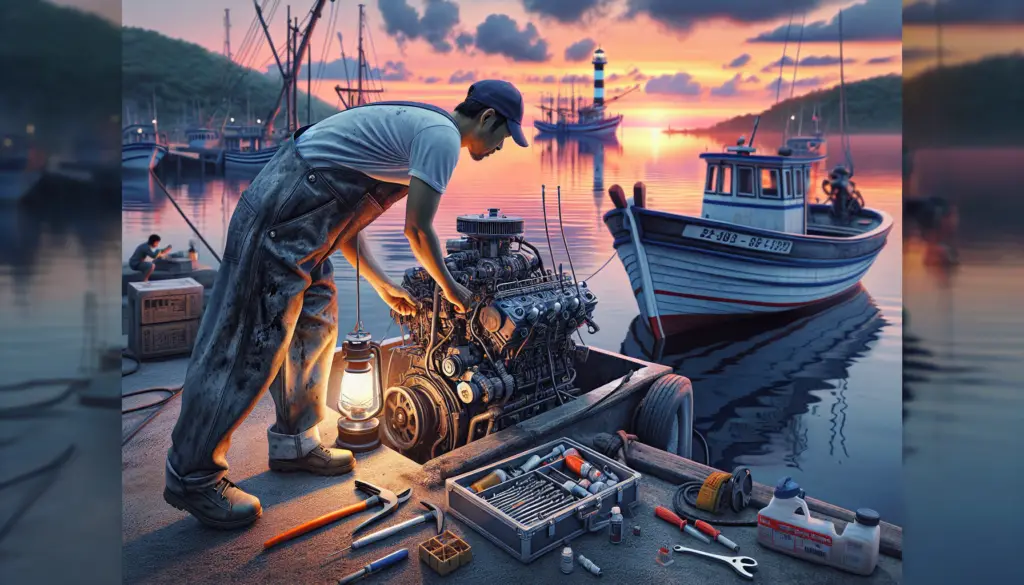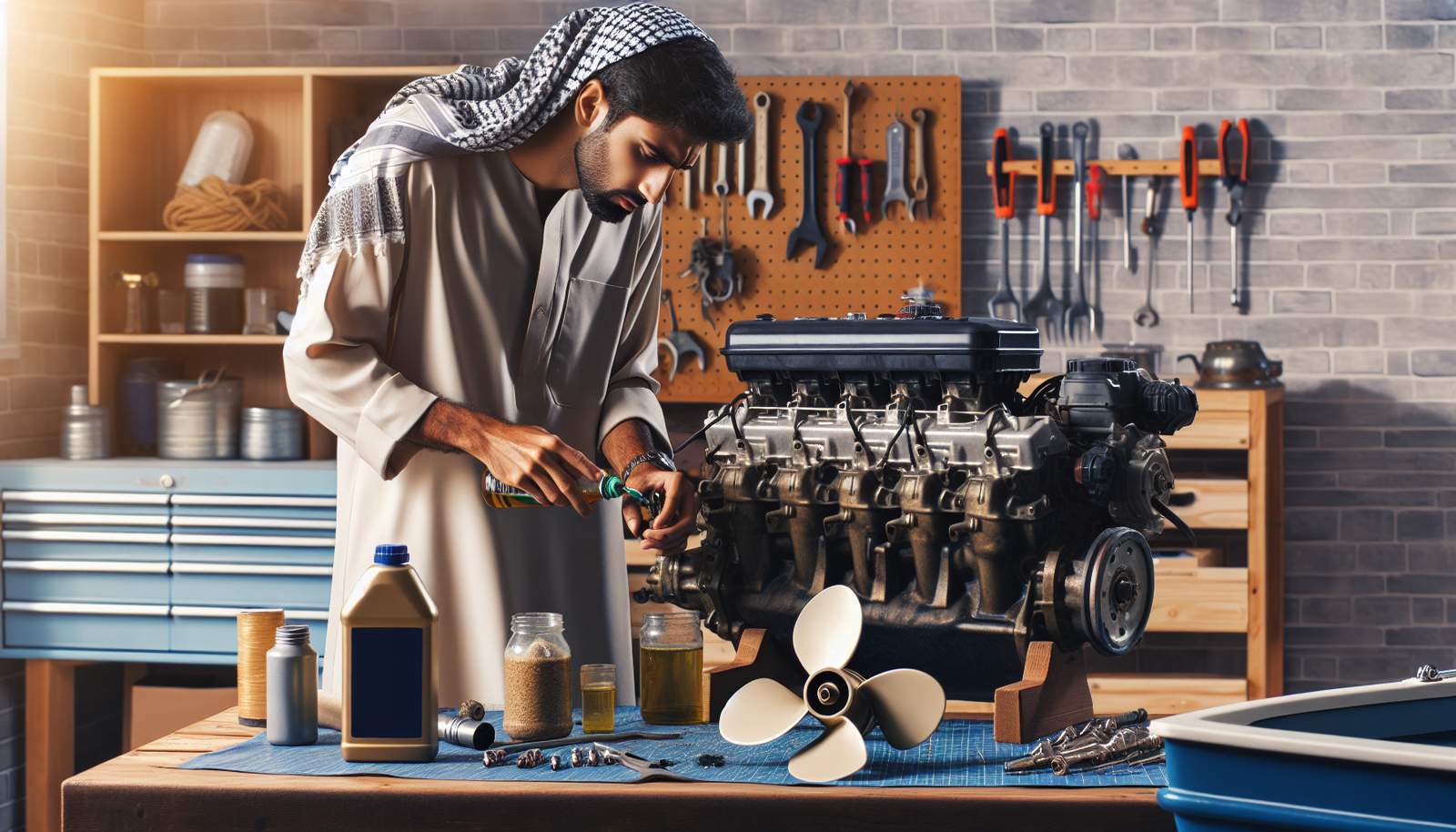Imagine the peace of a still lake, a fishing line lazily dancing in the early morning sunlight. This tranquil scene wouldn’t be possible without the reliable hum of your small fishing boat engine in the background. But for this trusty little worker to serve you seamlessly, it demands regular maintenance too. You can easily keep your fishing trips hassle-free with our top maintenance tips for small fishing boat engines. Whether you’re a seasoned boater or new to these waters, you’ll find steps to improve performance, maximize lifespan and reduce costly repairs. Your fishing excursions will never have to be cut short again. Let’s keep that engine purring so you can keep casting lines. Get ready to learn how to maintain your small fishing boat engine like a total pro.

Understanding Your Engine
Your boat’s engine is its lifeline. Regular upkeep can significantly affect its longevity, performance, and reliability. However, before you can properly maintain your engine, you need to understand it thoroughly. This comprehension starts with familiarization with your engine manual, identification of engine components, and understanding common problems.
Familiarize with Engine Manual
Just like every appliance in your home, your boat’s engine also comes with a manual. This manual is a treasure trove of information unique to your engine. It equips you with specific instructions on maintenance, operation details, tools required, and trouble-shooting guide. It’s crucial to read and comprehend this manual, as it provides guidelines pertinent to your engine.
Identifying Engine Components
The next step after understanding your engine’s instructions manual is identifying its components. This may seem difficult at first, given the numerous parts an engine contains. However, familiarity with primary parts like the air filter, carburetor, propeller, and transom mounts can provide a solid foundation. The manual can guide you through this identification process.
Understand Common Engine Problems
Engines, just like any other machine, have their fair share of problems. To ensure proper maintenance, you need to understand these common issues. They can range from overheating to fuel or oil leakage, inadequate power, strange noises, or failure to start. Gaining knowledge about these problems allows you to address them promptly or even prevent them from happening.
Regular Engine Checks
Regular engine checks are pivotal for optimal performance and long life of your engine. These checks help you identify problems before they balloon into significant issues. They involve visual inspection, checking oil levels, testing battery, detecting leakages and assessing the propeller condition.
Visual Inspection of the Engine
A quick visual inspection can reveal many potential problems. You need to examine your engine for any visible damages or changes. Look for signs of corrosion, loose or broken parts, or discoloration indicating overheating. Make it a habit to visually inspect your engine frequently to catch issues early on.
Checking Engine Oil Levels
Oil is a vital element for your engine’s smooth operation. Checking the oil level ensures that there’s enough lubrication to decrease friction among moving components. Read your engine manual to find the ideal frequency of checking and changing your oil and stick to it.
Testing Engine Battery
A faulty boat battery can leave you stranded in the middle of a lake or sea. Regular battery checks can help you avoid such situations. Look for signs of corrosion or leaking battery acid. Make sure that the battery terminal connections are clean and secure. Test the battery charge regularly to ensure it’s at optimal levels.
Leak Detection for Fuel and Coolant
Leakages, involving either fuel or coolant, can be dangerous. Regular leak detection checks need to be part of your maintenance routine. Check for leaks around the fuel tank, fuel lines, and coolant reservoir. If you identify any leakage, repair it promptly or seek professional assistance.
Checking the Propeller
The propeller is an essential part of your boat, responsible for its movement. Keeping it in good condition ensures your boat’s liquidity. Check it for any nicks, dents, or other damages. A damaged propeller can cause vibration, resulting in excessive wear and tear to the engine.
Routine Cleaning
Keeping your engine dirt and salt-free is crucial. Use a soft cloth or brush to clean the exterior surface of the engine. For the delicate interior components, using specialized cleaning products may be necessary.
Removing Exterior Dirt and Salt
After every trip, it’s a good idea to give your boat a good wash. Using freshwater, rinse away any salt, dirt, or other debris from the engine cover. Residual salt can lead to corrosion over time, so it’s crucial to clean it off to prolong the life of your engine.
Cleaning the Engine Interior
The interior of your engine also needs regular cleaning. Use an engine degreaser to remove any oil or fuel residue. Always ensure the engine is off and cool before starting. Then, spray it generously with the product and let it sit for a while before rinsing with water.
Ensuring Proper Ventilation
Proper ventilation is required to prevent moisture buildup, which can cause corrosion. Make sure that the engine cover allows enough ventilation. If needed, install extra vents to inhibit condensation and mildew.
Tools and Products for Engine Cleaning
There are various tools and products available for engine cleaning. This includes brushes, rags, engine degreasers, and rust inhibitors. Always choose marine-grade products. These are designed to be environmentally friendly and safe for your engine.
Changing the Engine Oil
Your engine oil needs changing at regular intervals to maintain its efficiency. The frequency and the type of oil to use depends on your engine model, which your manual will guide.
Ideal Frequency of Oil Change
An oil change is usually required every 50-100 engine hours, but refer to your manual to find the exact timeframe. Regular oil changes keep your engine running smoothly, reducing wear and tear.
Choosing the Correct Engine Oil
The choice of engine oil can significantly impact your engine’s performance. Your engine manual will provide insights about the correct oil to use. There are different types of oil suitable for various conditions. Make sure to choose the appropriate one based on your engine type and the conditions you often sail in.
Step by Step Guide to Changing Oil
Changing engine oil might sound intimidating, but it’s pretty straightforward. Your manual will provide a detailed, step-wise guide. Make sure to have the right tools handy, and follow the instructions closely. Also, dispose of the used oil responsibly.

Fuel System Care
Your engine’s fuel system needs regular attention and maintenance. Understanding your fuel system, checking and replacing fuel filters, maintaining fuel freshness, and using fuel stabilizers are critical components of this care.
Understanding Your Fuel System
A typical fuel system includes a fuel pump, tank, filters, injectors, and lines that transport the fuel. Understanding the functioning of these components helps in diagnosing potential issues, enhancing your boat’s performance, and reducing emissions.
Checking and Replacing Fuel Filters
Fuel filters remove any dirt or debris present in the fuel, preventing any damage to your engine. It’s crucial to check these filters regularly and replace them when necessary to ensure clean fuel supply to your engine.
Freshness of Fuel
Fuel doesn’t have an infinite shelf life. The fresher your fuel, the better your boat’s performance. Try not to store fuel for extended periods, and refrain from overfilling your fuel tank. Overfilling can lead to fuel expansion and damage the surrounding environment.
Using Fuel Stabilizers
Fuel stabilizers prevent fuel from going stale, especially for a boat that’s not used regularly. Adding a stabilizer every time you refuel ensures the fuel stays fresh and protects your engine against varnish and corrosion.
Spark Plug Maintenance
Spark plugs are crucial for starting your engine, hence their maintenance is essential too. This involves identifying worn-out spark plugs, knowing how to change them, and understanding the correct gap settings.
Identifying Worn Out Spark Plugs
A corroded or dirty spark plug can make starting your engine difficult. Signs of worn-out spark plugs include difficulty in starting the engine, low engine performance, high fuel consumption, or engine misfire. Regularly inspect your spark plugs for any wear or damage, and replace them as needed.
Methods to Change Spark Plugs
Changing spark plugs is usually a simple task that requires a spark plug socket and a ratchet. The process involves removing the old plug, inspecting the spark plug hole for any debris, installing the new spark plug, and then replacing the wire. Always make sure the engine is off and cool before starting.
Correct Spark Plug Gap Settings
Each engine requires a specific spark plug gap setting to run efficiently. Incorrect settings can affect engine performance, so refer to your engine manual for the accurate gap setting for your spark plugs.
Overheating Prevention
Preventing your engine from overheating is imperative for its health. This requires identifying signs of overheating, ensuring the cooling system is working properly, and conducting regular thermostat checks.
Identifying Signs of Overheating
Signs of an overheating engine may include an elevated temperature gauge, smoke, or steam coming from the engine, or strange smells. It’s critical to shut off your engine immediately once you notice any of these signs to prevent serious damage.
Ensuring Proper Cooling System Function
A working cooling system helps regulate your engine’s temperature, preventing overheating. Regularly check the coolant level and ensure that the cooling system is free of debris.
Regular Thermostat Checks
A faulty thermostat can lead to overheating, which may cause serious engine damage. Regularly check the thermostat to ensure it’s functioning properly and replace it as advised in the manual.
Engine Winterization
Preparing your engine for winter storage—or winterization—is essential to prevent damage from freezing temperatures. Understanding the importance of winterization and the process to do it right is crucial to keep your engine in optimal condition.
Importance of Winterization
Winterization is crucial because any residual water in the engine can freeze, expand and cause severe damage. Additionally, winterization helps in reducing the risk of corrosion and helps to prevent the fuel from degrading.
Step by Step Winterizing Process
Winterization involves a range of tasks, including changing the oil, adding fuel stabilizer, flushing the engine with antifreeze, and disconnecting the battery. All removable parts should be properly cleaned and stored. The specifics vary from engine to engine, so consult your manual for detailed instructions.
De-winterizing Your Engine
Just as important as winterizing is de-winterizing your engine when boating season begins. This process involves reconnecting the battery, checking all fluid levels, inspecting for damages, and more. Always test your boat in the water for a short while to ensure all systems are working properly before any long trip.
Battery Maintenance
Proper battery maintenance can save you from the inconvenience of a dead battery while out on the water. It involves understanding the different types of batteries, cleaning them regularly, ensuring they are properly charged, and replacing worn-out batteries.
Battery Types and Their Care
Marine batteries come in different types—starter, deep cycle, or dual-purpose. Understanding which one you have can help provide appropriate care. Regular maintenance includes cleaning the battery terminals, checking for any leaks, keeping it charged, and storing it in a cool, dry place.
Regular Battery Clean-up
Corrosion can impede your battery’s performance, so regular clean-ups are important. This can be done using a solution of baking soda and water. Always disconnect the battery before cleaning to prevent any accidental sparks.
Ensuring Correct Battery Charge
Ensure that your battery is fully charged before any boating trip. Prolonged periods of inactivity can cause batteries to lose charge, so regular charging, especially before a long trip, is crucial.
Replacing Worn Out Batteries
Even the best batteries have a finite life, and ignoring the signs of a failing battery can be risky. Swolen battery case, difficulty in starting, dimming lights, or frequent need for a jump-start are signs of a worn-out battery and indicate it’s time for a replacement.
Professional Maintenance and Repair
While taking care of your engine regularly can prevent a lot of issues, some things are better left to the professionals. Understanding the importance of getting professional help, knowing what your engine warranty covers, and finding a trustworthy service provider are essential steps in ensuring a long and efficient life for your engine.
When to Seek Professional Help
Some engine problems require professional expertise. If you notice persistent unusual sounds, frequent power loss, excessive smoke emission, or other abnormal performance, it’s best to seek professional help.
Understanding Engine Warranty
Your engine warranty is a valuable piece of paper. It offers you certain protections and services over a specified period of time, or until your machine accrues a specific amount of hours. Always understand the details of your warranty, its coverage, and its expiry date to benefit from it.
Finding Trustworthy Boat Mechanics
Just like finding a good doctor for your health, finding a reliable mechanic is crucial for your boat’s health. Look for someone with a good reputation, carries the necessary certifications, and preferably specializes in your type of engine. Conducting regular maintenance checks will foster a good relationship between you and your service provider.
In summary, ensuring your engine’s longevity is not a heavy-duty task if you are willing to dedicate some time and effort. Regular maintenance, routine checks, and being familiar with your engine’s components and operation can help keep your fishing trips enjoyable and worry-free. Your boat’s engine is its heart, and taking good care of it will extend the life and value of your boat.

